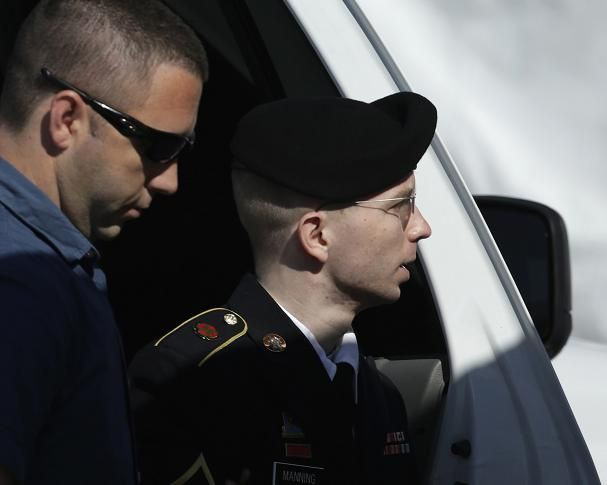Manning WikiLeaks Verdict: Like Edward Snowden, Manning Charged Under The Espionage Act

The Obama administration has made it a habit to prosecute government leakers under the Espionage Act, the 1917 statute used to lock away or execute Soviet-era spies whose work sometimes resulted in the deaths of U.S. informants. The two most famous cases involve Army Pfc. Bradley E. Manning, who admittedly turned over some 700,000 pages of documents to the anti-secrecy group WikiLeaks, and former National Security Agency contractor Edward Snowden, whose leaks of NSA surveillance programs have roiled the national security and civil liberties communities this summer. While Snowden remains overseas in Russia, trying to avoid extradition to the United States, Manning is being court-martialed in the States, and his verdict is expected to come down Tuesday at 1 p.m. ET.
A former intelligence analyst serving in Iraq, Manning faces 21 charges, including the most serious under the Espionage Act, aiding the enemy. He took the unusual step of pleading guilty to lesser versions of 10 of the charges. Manning could face life in prison without parole if the judge, Col. Denise Lind, finds that he released classified documents in order to make them available to enemies of the U.S. The charges he has pled guilty to could result in a maximum 20-year sentence.
Though two of Snowden’s charges in a formal complaint filed in June fall under the Espionage Act, he is not charged with aiding the enemy. Instead, he is charged under the statute with “unauthorized communication of national defense information” and “willful communication of classified communications intelligence information to an unauthorized person.” Those charges are not final until Snowden is, if ever, formally indicted.
Over the course of Manning's eight-week court martial, the government made the case that the soldier knowingly tried to help al Qaeda when he leaked thousands of documents to WikiLeaks. Before his trial began, Manning read a long statement in which he said he only wanted to spark a debate about the wars the U.S. was engaged in.
The Manning case has drawn criticism for both the espionage charges brought against him and his treatment in the period before his trial, which included solitary confinement for long enough periods of time to amount to torture, according to a U.N. report. In fact, the harsh treatment of Manning, and the possibility that he'll get life in prison, has been cited as reasons why Snowden chose to flee the United States when he revealed details of the government’s surveillance programs in June. Snowden has spoken highly of both Manning and WikiLeaks.
But Snowden took a different tack from Manning, choosing to not only flee the U.S. but also reveal himself. Manning might never have been caught if his identity had not been revealed by a computer hacker, Adrian Lamo.
Snowden was the eighth leaker charged under the Espionage Act by the Obama administration.
© Copyright IBTimes 2025. All rights reserved.






















